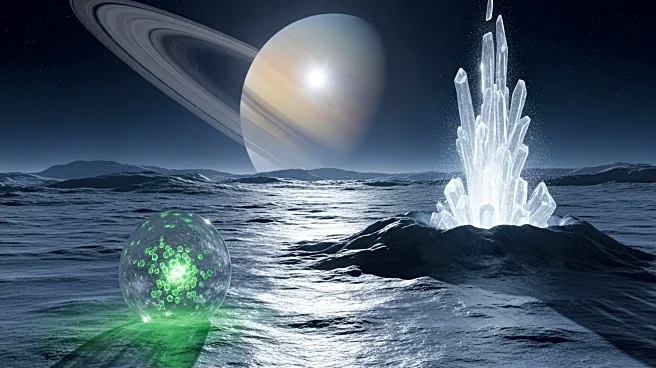What's Happening?
Researchers have identified complex organic molecules within the icy plumes erupting from Saturn's moon Enceladus, suggesting that its subsurface ocean may harbor conditions conducive to life. The discovery was made using data from the Cassini mission, which previously revealed water ice grains and vapors emanating from Enceladus's south pole. The James Webb Space Telescope has since captured images of these plumes extending nearly 6,000 miles into space. The presence of organic substances, detected for the first time, indicates complex chemical processes beneath the moon's icy crust. Dr. Nozair Khawaja, a planetary scientist, emphasized that these findings enhance the moon's habitable potential, supporting plans by the European Space Agency to investigate Enceladus for signs of life.
Why It's Important?
The discovery of organic molecules on Enceladus is significant as it strengthens the hypothesis that extraterrestrial life could exist within our solar system. This finding could have profound implications for astrobiology and the search for life beyond Earth. The presence of complex chemistry suggests that Enceladus's subsurface ocean might support biological processes, making it a prime target for future exploration missions. The European Space Agency's proposed mission to Enceladus could provide critical insights into the moon's potential for life, influencing future space exploration strategies and funding priorities.
What's Next?
The European Space Agency plans to launch a mission to Enceladus around 2042, aiming to directly search for biological signs. This mission will include an orbiter to fly through the plumes and a lander to explore the moon's south pole region. The findings from this mission could validate the presence of life-supporting conditions and potentially discover signs of life. Such discoveries would have significant implications for our understanding of life in the universe and could drive further scientific and technological advancements in space exploration.
Beyond the Headlines
The discovery on Enceladus raises ethical and philosophical questions about the implications of finding life beyond Earth. It challenges our understanding of life's uniqueness and could influence cultural and scientific perspectives on humanity's place in the universe. Additionally, the technological advancements required for such missions could spur innovations in other fields, including robotics and remote sensing.








